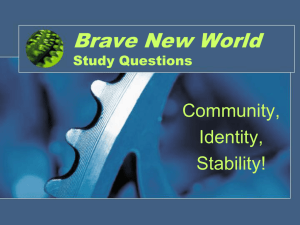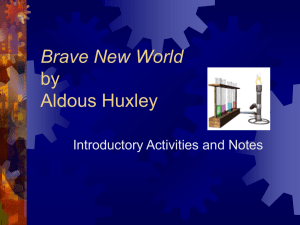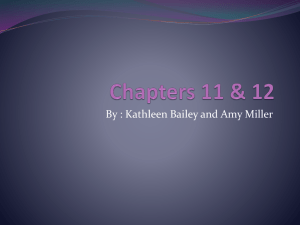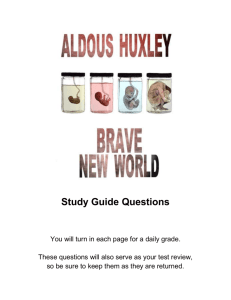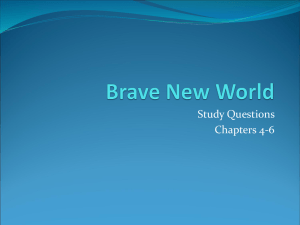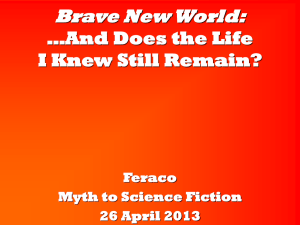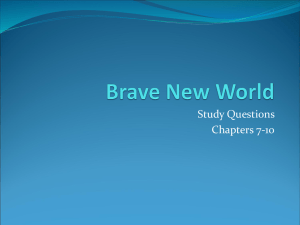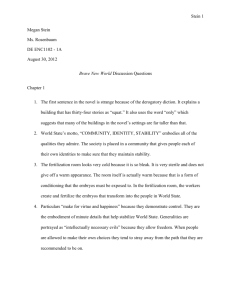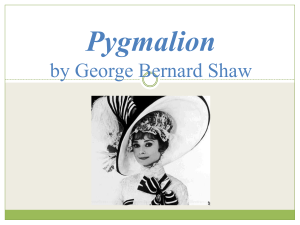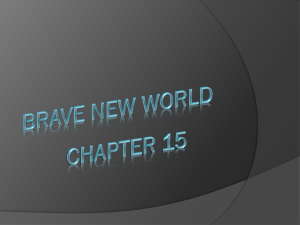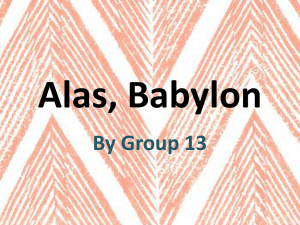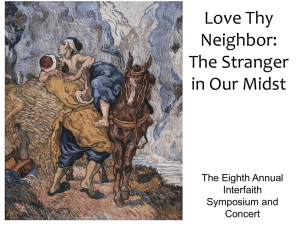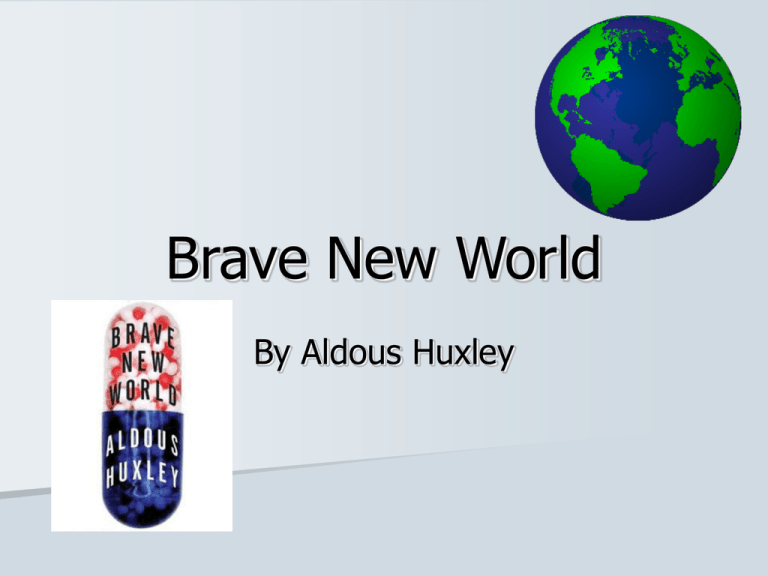
Brave New World
By Aldous Huxley
Brave New World
First published in 1932.
Set in a future seemingly utopian society.
Utopia = a perfect or ideal society.
What would be included/allowed in your
utopia?
Brave New World
No one ever gets old or ill.
No one has parents.
There are no long term, loving
relationships – e.g. between boyfriend and
girlfriend or man and wife.
You can have as much sex as you want
and there is no moral judgement made.
Infact multiple sexual partners are
encouraged!!!!!
Brave New World
Drug taking is encouraged – soma rations are
handed out to all citizens to stop them being
depressed/angry/unhappy.
There is no fighting, rebellion or questioning of
authority because everyone is content.
Because no-one ever forms real attachments to
each other – e.g. no mother, father, sister,
brother then you will never experience grief and
you are conditioned to accept death without
emotion.
Biological Engineering
Human beings are grown in laboratories
and brought up in large nurseries by staff
rather than parents.
The opening chapter takes place in The
Central London Hatchery and Conditioning
Centre.
Caste System
Alphas – most intelligent, attractive and
physically developed.
Betas
Gammas
Deltas
Epsilons – least intelligent and physically
developed, often handicapped.
Bokanovsky Process
The Bokanovsky process means one
embryo can be split to produce hundreds
of human beings who are the same. Only
applies to Gammas, Deltas and Epsilons.
Chapter 1
1.
2.
3.
4.
5.
In your own words try to explain the
purpose of the Bokanovsky process.
(pg.4)
Explain what the predestinators do.
What is a freemartin? (pg. 9)
How do they prepare the foetuses to be
lower caste members?
In what other ways are the the foetuses
prepared for their future life?
Chapter 1
The writer uses the Director’s lecture to
his students as a way of introducing and
explaining his imagined setting.
1.
What does the process that the foetuses
go through in the Hatchery remind you
of? Explain your answer.
Lenina
We are introduced to Lenina at the end of
this chapter.
1. What do we find out about her? Write
down as much info as you can.
2. Is there anything surprising to the reader
about the encounter with Lenina? Explain
Chapter 1
Look at the descriptions of the fertilizing
room on page one. Copy down any words
or phrases which suggest the place is cold,
scientific and unnatural.
Chapter 2
The tour of the Hatchery and Conditioning
Centre is continued with a trip to the
Infant Nurseries.
We see a group of Delta children being
conditioned to dislike books and flowers.
The Director explains to them how sleep
teaching or hypnopaedia was discovered
and how it is used to condition children.
Chapter 2
Children given lessons on Elementary Sex
and Elementary Class Consciousness:
“Alpha children wear grey. They work
much harder than we do, because they’re
so frightfully clever. I’m really awfully glad
I’m a Beta, because I don’t work so hard.
And then we are much better than the
Gammas and Deltas. Gammas are
stupid…”
Chapter 2
1.
Describe the methods used to condition
children in this chapter.
2.
Do you agree with them?
Chapter 3
Chapter 3 moves between three
situations:
Lenina getting ready.
Mustapha Mond talking to the students.
Bernard Marx and Henry Foster.
Chapter 3
What do we find out about the following
three characters in this chapter:
Henry Foster
Lenina Crowne
Bernard Marx
Chapter 4
1.
2.
3.
Look at page 49. How do the men in the
lift react to Lenina? What annoys Lenina?
Why do you think this detail is included?
How does Bernard react when Lenina
agrees to the date? Why does he react
like this?
Look at pages 50-51. What does the
description of the lift attendant show us?
Bernard
1.
2.
3.
4.
What more do we find out about Bernard
on page 55? Write down as much as you
can.
Why do you think Bernard is discontent?
Compare Bernard with his friend
Hemholtz Watson. What do they have in
common?
In what way are they opposites?
Chapter 5
Part One – Lenina and Henry go to a multisensory concert
Part Two – Bernard goes to a Solidarity Service.
Both events are designed to create a sense of
being part of something greater than an
individual, they are also about pleasure – the
main pursuit in this society.
Chapter 5
1.
2.
3.
4.
5.
Look at page 63. What does Lenina say that
shows she has been conditioned to dislike
lower castes?
What does Henry say which tells us the reason
the lower castes never rebel? (pg.64)
In what way is Henry’s reaction to the
cremation unexpected? (pg. 64-65)
Describe Lenina and Henry’s evening.
Describe Bernard’s evening. In what ways are
they similar? In what ways are they different?
Brave New World
Differences to our
world
Similarities to our
world
Communism v Capitalism
Communism – Based on the idea that the
workers are the most necessary part of any
economy. There is no private property or
business. The government own and control
everything and the government is run by the
workers.
Everyone has equal status as there is no private
property and everyone is paid the same
“From each according to his ability, to each
according to his need” – Karl Marx.
Classless society.
Communism v Capitalism
Capitalism – Less government interference.
Means of production (factories, businesses) are
privately owned and run for profit.
Classes are important as the middle and upper
class run the businesses while the working class
work.
There is more inequality.
Consumer Capitalism is encouraged as a way of
creating continuous growth in the economy.
Historical Context of novel
Written in 1931 and published in 1932.
The novel is a response to the rapid changes
that were taking place in society at this time.
The Industrial Revolution meant the world was
transformed through science and machinery –
improved medicine, sanitation, transport and
communication links meant life was getting
better for many. There was a lot of utopian
fiction written at this point.
Then WW1 – 1914 and post world war era.
Historical Context
First World War brought the end of this
idealistic view of the future.
Russian Revolution – Communist
revolution in Russia – state controls
everything and everybody – we can see
that this is satirised in ‘Brave New World’.
Roaring Twenties
The Roaring Twenties is a phrase used to describe the
1920s, principally in North America, but also in London,
Berlin and Paris for a period of sustained economic
prosperity.
After the doom of the First World war people started to
break free from traditions:
Women gained more independence.
The working classes had more money to spend on
leisure pursuits – drinking, dancing, music halls, etc.
Jazz and dancing rose in popularity and sexual morals
began to change.
Consumer consumption was encouraged as a way of
achieving economic stability.
Henry Ford
Founder of the Ford Motor Company.
Developed assembly line technique of mass
production.
Model T automobile revolutionized
transportation and American industry.
He became one of the richest and best-known
people in the world.
He is credited with "Fordism": mass production
of inexpensive goods coupled with high wages
for workers. Ford had a global vision, with
consumerism as the key to peace.
Brave New World
What elements of both Capitalism and
Communism do we see in ‘Brave New
World’?
Chapter 6
In groups list as many hypnopaedic
phrases as you can from part one, chapter
six.
Chapter 6 – Part Two
1.
2.
3.
4.
5.
What does the Director tell Bernard
about?
Why is the Director’s story inappropriate?
What does the Director threaten Bernard
with?
What is Bernard’s initial reaction to this
threat? (pg.85)
What faults does Helmholtz pick out in
Bernard?
Chapter 7 (VII)
1.List at least five quotations that show
Lenina’s disgust/shock/horror at life in the
Savage Reservation.
2.What various things about Linda disturb
Lenina?
3. What else do we find out about Linda?
4. Why do the other women in the village
dislike her?
Chapter 8 (VIII)
Told from John’s point of view. Through a series of
flashbacks:
Memories of Linda and Pope - Linda finding comfort in
sex and alcohol.
The way he is ostracized by the other children.
Rejected by his mother
Shakespeare helps John to express his emotions and
inspired by Hamlet he attempts to stab Pope.
John feels completely unhappy and alone, except when
he makes the waterpot – this gives him a sense of
purpose.
At the end of the chapter he finally has hope – “Oh
brave new world” – The Tempest. We know that like
Shakespeare’s character (Miranda) he will be left
disappointed.
Chapter 8 (VIII)
Why might John be disappointed in the
new world?
Chapter 9 (IX)
1.
2.
3.
4.
How does Bernard act towards the
Warden? What does this tell us about
Bernard? (pg. 123)
What does John do when Lenina is
sleeping (on soma holiday)?
How does he feel about her?
What emotion does he feel when he
thinks about taking her clothes off? Use
a quotation to show this.
Chapter 10 (X)
1.
2.
3.
4.
Where does this chapter take place?
What is Bernard accused of? (pg 129130)
How do the other workers respond to
Linda and John? (use quotations)
How does the Director respond? (use
quotations)
Chapter 11 (XI)
1.
2.
3.
4.
5.
We see Bernard start to change in this section.
What evidence is there of this? Use quotations.
How do we know that Bernard is still not
accepted in this society?
What disgusts John about ‘Brave New World’?
What more do we find out about education at
Eton?
Why do you think John rejects Lenina at the
end of this chapter?
Chapters 11 & 12
Bernard introduces John to life in The World
State.
John is disgusted by how superficial, inhumane
and immoral life is – treatment of Linda, free
sexual morals, lack of individuality, etc.
Bernard show that he wasn’t actually as
unorthodox as he believed. He is seen to be a
hypocrite as he now enjoys the features of
society he had previously criticized – privileges
of being and Alpha male, sex and even soma.
Questions….
What questions do you have about the
novel so far…………..
In groups
List the various personality traits of
Bernard so far…… e.g. insecure.
Now use these to create a group mind
map about Bernard.
You can also include appearance and
background.
Chapter 13
Placemat activity:
1.
2.
3.
4.
What happens in this chapter?
What is the most significant event?
Why does John react the way he does to
Lenina?
Is his treatment of Lenina fair?
Chapter 13
1.
2.
3.
4.
Why is Lenina frustrated at the start of
this chapter?
What shocks Fanny about Lenina?
What is Fanny’s advice?
How does John react when Lenina
seduces him and why?
Chapter 14 pg174
This chapter takes place in The Park Lane
Hospital for the Dying.
The attitude towards death in The World State is
very different to our own.
Task: List as many details from this chapter which
highlight this contrast in attitude.
Now put them in order starting with the one you
find the most shocking.
Chapter 14
1.
2.
3.
In what way is John rejected by his
mother in this chapter?
Why does John get so angry with the
children in the ward?
What happens at the end of this
chapter? What pattern can you see in
John’s behaviour?
Chapter 15 – pg 183
1.
2.
3.
4.
5.
What is the most important event in this
chapter and why does it occur?
What does John believe he is offering the
workers by throwing the soma away and why?
When the soma ration appears we are told it
was “as though they were looking at fireworks”
(pg 184). What does this simile suggest?
Explain John, Helmholtz and Bernard’s differing
reactions to the riot.
What does the fact there are police with
weapons and an ‘Anti-Riot Speech’ tell us?
Mustapha Mond
Which of the following words/phrases best
describe Mustapha Mond. Pick 3 and explain
your reasoning:
Rational
Intelligent
The villain of the novel
Harsh
Charming/charismatic
Self-sacrificing
Unorthodox
Mustapha Mond
What do we found out about Mustapha
Mond’s background in this chapter?
Bullet point any relevant information
Chapter 16
1.
2.
3.
4.
Explain the results of the Cyprus
experiment. What does this prove? (pg
196-7)
Why can’t science be allowed to develop
unrestricted?
What has to be sacrificed in order to
achieve happiness?
How does Bernard act in this chapter?
Chapter 17
1.
2.
3.
Mustapha Mond and John are left alone in this
chapter.
John argues for God and Mustapha Mond
against God.
What does Mustapha Monda tell John about
God in this chapter?
What is a Violent Passion Surrogate and what
is it for? (pg. 211)
Is this chapter for or against religion? Explain
your answer.
Chapter 17
Mustapha Mond argues that God may exist but that
society no longer has a need for him.
All the problems that make people turn to God – ill
health, the vulnerability of old-age, unhappiness, etc no
longer exist.
John argues that religion is necessary as a means of
guidance and that there must be something above
human existence. There must be something more noble
that the way of life in The World State.
Chapter 17
John argues that life in the World State is simply “too
easy”. The have got rid of anything that might cause
suffering or pain.
John thinks there is no challenge for the human spirit
anymore: “Nothing costs enough here”.
Extremes of emotion/human experience are shown to be
necessary with the Violent Passion Surrogate (Pg. 211)
“But I don’t want comfort. I want God, I want poetry, I
want real danger, I want goodness, I want sin” (pg. 211)
– John believes we need these extremes of emotion to
truly have the full human experience, otherwise we are
living a half-life, unfulfilled by any true/experience or
higher emotion – e.g. love, heroism.
The disadvantage of these emotions is that with love also
comes hatred, betrayal, fear – instability. Mond argues
we only need religion when there is instability!!
Chapter 18
Bullet point the main events in this chapter.
Chapter 18
1.
2.
3.
4.
5.
What causes the happiness experienced by the
three men on page 214? In what way is it
different from the happiness experienced by
most citizens in the World State?
John prays for forgiveness from various Gods.
What does he want forgiveness for? (pg. 215216)
Why does John enjoy the physical work? (pg.
218)
How do you think Lenina feels about John?
Give evidence for your answer (pg. 227)
Why did John kill himself?
Themes – Placemat Activity
Individually –
What is a theme?
What are the themes of the novel?
Groups- Pick out the top 5 themes.
Themes
The use of technology to control society
The misuse of science
Dangers of a consumer society
The incompatibility of happiness and truth
The decline of the individual
The dangers of an all powerful state
The State versus the individual
Isolation/Alienation
Government control
Characters
List the main characters in the novel.
Setting
The World State
The Savage
Reservation
Pages 92 -126 ,
Chapters 7-9
Critical Essay Assessment
In the exam you only have 1 hour and 30
mins to write 2 essays
45 minutes per essay.
Assessed on:
– Understanding
– Analysis
– Relevance
– Technical Accuracy
Essay Question
Choose a novel in which a character
chooses to escape from the constraints of
his or her environment or situation.
Explain why the character feels the need
to escape and show how his or her
response to the situation illuminates a
central concern of the text. (2010)
Essay Question
Choose a novel in which a character
chooses to escape from the constraints of
his or her environment or situation.
Explain why the character feels the need
to escape and show how his or her
response to the situation illuminates a
central concern of the text. (2010)
Planning
1.
2.
Which character will you choose and
what constraints are they trying to
escape?
What themes (central concerns) does
their situation and their actions help
explore (illuminate/highlight) for us –
keep it simple and just pick one or two!
The Start of the Novel
Read over the first few pages again.
We are immediately meant to be disturbed
by this world.
How does the writer make it seem
disturbing? In what ways does this world
seem strange?
The Ending
1.
2.
3.
4.
5.
Explain what happens at the end of the
novel.
Why do you think Lenina goes to see
John?
Why does John attack Lenina?
Why does John take part in the orgy?
Why does John kill himself?
Christmas Holiday Homework
1.
Choose a novel in which the setting in
time and/or place is a significant feature.
Show how the writer’s use of setting
contributes to your understanding of
character and theme. (2009)
Christmas Holiday Homework
2. Choose a novel, set in a time different
from your own, with a theme relevant to
the world today.
Show how you are led to an appreciation
of the theme’s continuing relevance,
despite its setting in time. (2006)
Quotations
“Everyone belongs to everyone else”.
Explanation: This is one of the World State’s mottos
and children are taught this from an early age. Lenina
repeats this several times throughout the novel, as does
Linda to justify her promiscuity. The motto shows us that
there is no such thing as monogamy and love for one
other person. Instead the state encourages people to be
promiscuous. Huxley uses this motto to show the lack of
morality and the superficial values promoted by the
World State. Huxley saw a decline in sexual morals in the
post war years and wants to highlight the superficial
nature of this type of society, where sex has more value
than love.
Write you own explanations for the
following:
They’re blissfully ignorant of passion and old
age…they’ve got no wives or children or lovers
to feel strongly about – 194
Lenina Crowne…Wonderfully pneumatic. I’m
surprised you haven’t had her - 37
But I don’t want comfort. I want God, I want
poetry, I want real danger, I want goodness. I
want sin. - 211

